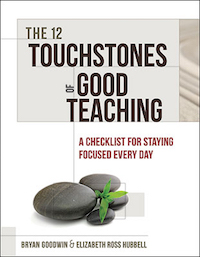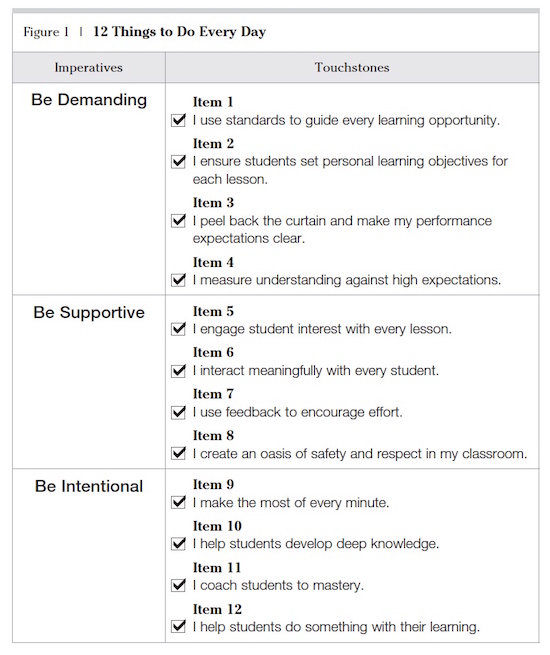12 Teaching Touchstones: Stay Focused Every Day
The 12 Touchstones of Good Teaching: A Checklist for Staying Focused Every Day
By Bryan Goodwin and Elizabeth Ross Hubbell
(ASCD, 2013 – Learn more)
Reviewed by Anne Anderson

The authors use great examples and numerous metaphors – even a reference to Woody Allen’s movie “Take the Money and Run.”
TOUCHSTONE: Something that is used to make judgments about the quality of other things

- Be demanding: Align teaching with high expectations for learning.
- Be supportive: Provide a nurturing learning environment.
- Be intentional: Know why you’re doing what you’re doing.
The authors are upfront that the ideas and suggestions in The 12 Touchstones of Good Teaching are not necessarily new stuff that will “fix” education; rather, they suggest that teachers focus on “doing what we know must be done and doing it well in every classroom, with every student, every day of the week.” (p. xxix)
Be Demanding
This first imperative, Be Demanding, has four touchstones. For the first touchstone — “use standards to guide every learning opportunity” — we are reminded to unpack the standards in order to know and understand what students must learn. Goodwin and Hubbell suggest looking for big ideas and essential questions that are embedded in the standard.
Their suggested Goal-Setting Template (Figure 2.1, p. 22) should be extremely useful in helping students set and master learning goals. Throughout this section, the authors provide supporting research, suggested resources, and In-Practice Examples. The four chapters in this section contain numerous reminders of things we know and believe, but sometimes forget.
Be Supportive
The four touchstones in the Be Supportive section can help “add warmth to teachers’ demandingness and provide the kinds of supports for learning that research shows students need to be successful learners.” (p.64) The chapter on student engagement jogs our memories about designing appropriate lesson hooks, mixing things up during the lesson, and offering choices.
The touchstone “interact meaningfully with every student” is critical to student success. The authors include research from several studies to support this. Their suggested tips include:
- Greet every student when he or she comes into class.
- Don’t just ask questions; call on students.
- Don’t forget nonverbal communication.
- Learn students’ names quickly.
Goodwin and Hubbell’s suggestions to show students we care about them as individuals are both common sense and good manners.
Be Intentional
The touchstones of Be Intentional require us to
- Reflect on our instructional practices,
- Ask ourselves the why question about our instructional practices, and
- Provide the research-based rationale for those practices.
The authors remind us how crucial planning is to improved student achievement. “Aiming for bell-to-bell learning,” “embedding learning into noninstructional time,” and “breaking learning into discrete chunks of time,” allow teachers to make the most of every minute of class time. (p.133) Conducting a time audit in your classroom could be beneficial.
When coaching students to mastery, the teacher must provide frequent checks for understanding. The authors suggest both low-tech and high-tech methods for checking for understanding:
- Turn and Talk
- Individual Dry-Erase Boards
- Student Response Systems
- Matching Activities
- Thumbs Up
- Exit Tickets
The authors drive home their point about intentionality on page 182 with the question that teachers need to be asking with more frequency and urgency: “Now, why am I doing this?”
Do not expect a traditional check list; what you will find is criteria for determining the effectiveness of your teaching. The 12 Touchstones of Good Teaching: A Checklist for Staying Focused Every Day will be a welcomed addition to your professional library.
If you use this title for a faculty study, then be sure to use the ASCD Study Guide for this book.
Anne Anderson finally got out of the 8th grade after 24 years and 9 weeks. She spent the next 9 years sharing her expertise in literacy and writing with K-12 teachers and administrators throughout the district. She credits National Writing Project and Poetry Alive! as turning points in her growth as a teacher. She now shares her expertise nationwide as an educational consultant and through her website and her bi-monthly newsletter, Spotlight on Success.



































